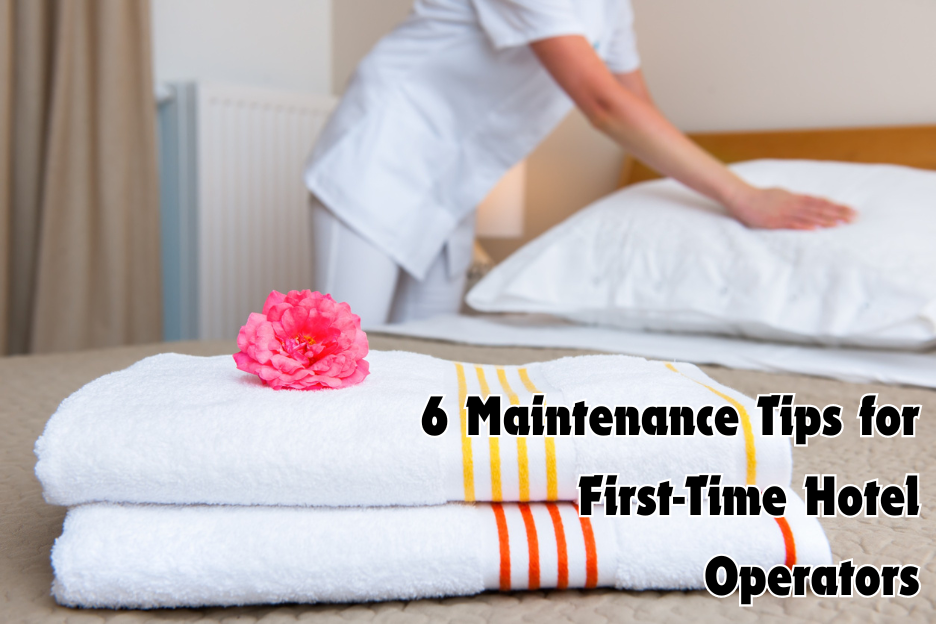Creating your hotel’s maintenance plan before you open your doors to guests can help you build a superb reputation and lead to a healthier bottom line. First-time hotel owners or operators don’t start with the experience gained through years in the business. Let’s review a few key tips to help you form a workable plan and execute it to keep your hotel in top operating condition.
1. Understand Laws, Building Codes, and Inspection Regulations
Know the laws governing hotels and building codes. Build your maintenance plan around these laws. For example, according to the NFPA25 Code, a hotel must visually and functionally test its fire protection systems each month, quarter, and year. The law also requires a semi-annual, 5-year, and 10-year test. Plan these tests formally by including them in your scheduled preventative maintenance tests.
Create a schedule of required annual inspections and post it for employees and building managers. For instance, U.S. law requires that commercial buildings undergo an annual fire inspection. As a part of your preventative maintenance, schedule an annual roof inspection and one for the boiler and plumbing.
2. Test Equipment
Test essential equipment in each room every day. Make a list of items for the housekeeping/maid service to check, such as turning on and off each light switch and testing the remote control for the TV. During their room cleaning, the staff will discover burned-out light bulbs, faulty switches, dead remote control batteries, and malfunctioning TVs. Provide replacement batteries and light bulbs for each housekeeping cart so they can fix small problems without calling another department. Provide walkie-talkies or a staff-only phone number for maintenance so they can report electrical issues immediately. Fixing switches and replacing broken TVs keeps guests happy and lets you rent out every room.
3. Maintain HVAC Systems
Add checking the heating and cooling to the housekeeping list, too. This daily check saves you money because in commercial buildings, heating, cooling, and ventilation (HVAC) accounts for 44% of the building’s energy use, according to the U.S. Department of Energy. A malfunctioning HVAC can use too much energy, but a quick repair makes it function efficiently again, saving money.
4. Keep Track of Maintenance
Maintain daily maintenance logs. These logs should include the daily room checks and repair information. Also, use a computer program to assimilate the maintenance information. Many of today’s applications include mobile apps that employees can install on their smartphones. Using this method saves the hotel from needing to purchase tablets for each housekeeping cart or maintenance crew member.
5. Consider Prevention Over Reaction
Focus on preventative maintenance to save money and build your hotel’s reputation. Daily room and public area cleaning improves reputation. Spray for bugs and install rodent traps outside the hotel.
Make reactive maintenance repairs the same day you learn about the damage. Don’t wait to fix the damage to your hotel. You can’t rent a damaged room, so repairing it quickly improves your bottom line. Prioritize repairs to public areas because every hotel resident sees the damage. Showing your concern over the problem by repairing it improves guests’ opinion of the hotel.
6. Finance Properly
Build the knowledge that you will need to make repairs into your budget. Set aside funds each month for emergency repairs and expect the unexpected. In addition, properly insure the building and its contents. For a small monthly premium, you can cover the costs of repairs and the cost of hiring the specialists to make them.
There’s no way to completely prevent damage to a hotel. A guest’s trunk might gouge the hallway wall, or an argument in a room might result in a broken lamp or phone. Floods, hurricanes, hail, thunderstorms, and fires may occasionally cause damage. Preparing for the inevitable can ease repair time and make it cost less. Consider these tips as you get your hotel business off the ground!















Leave a comment